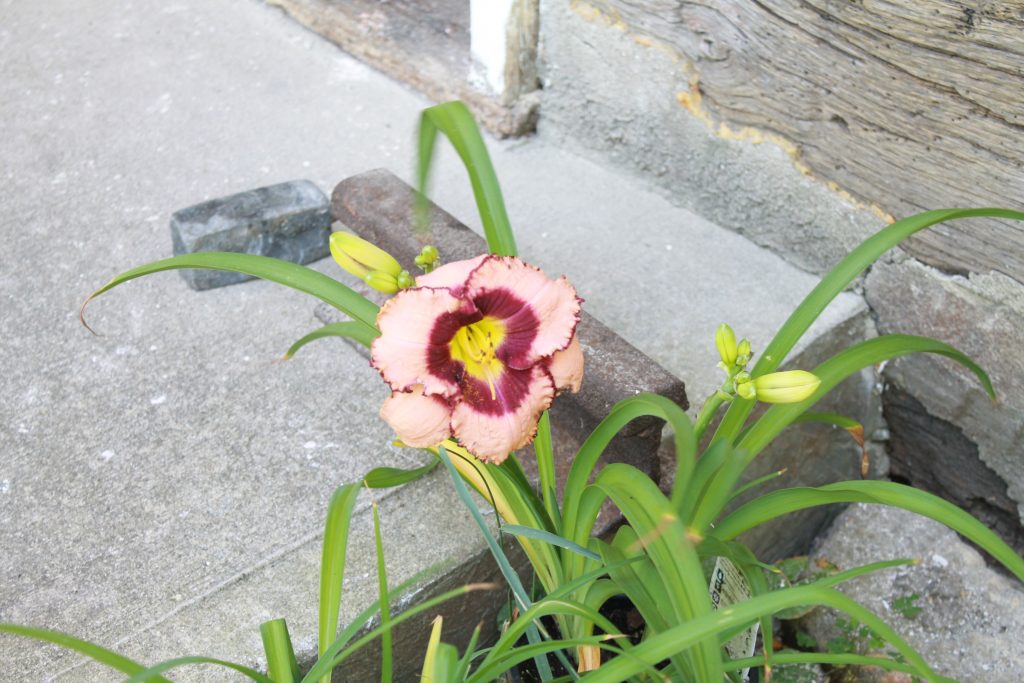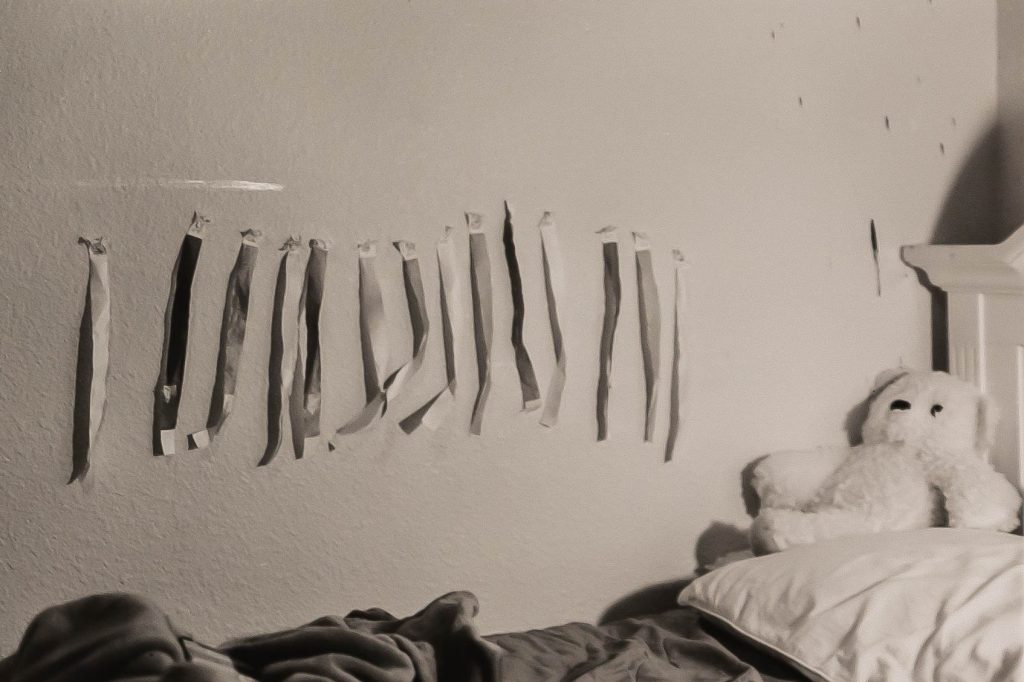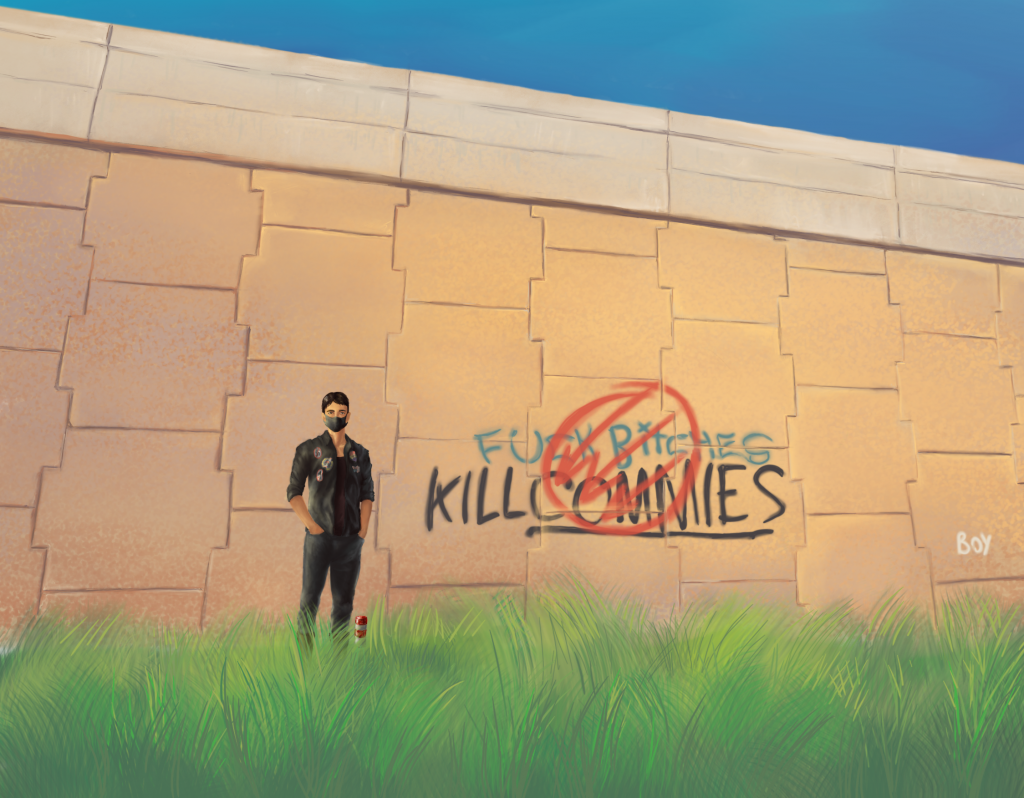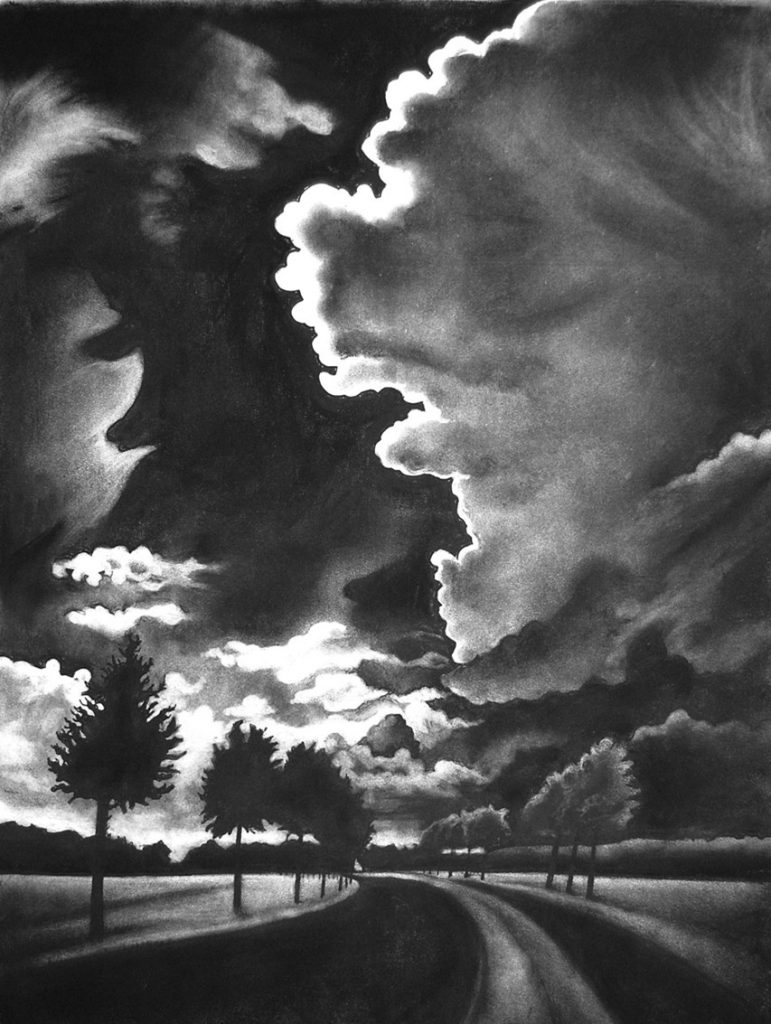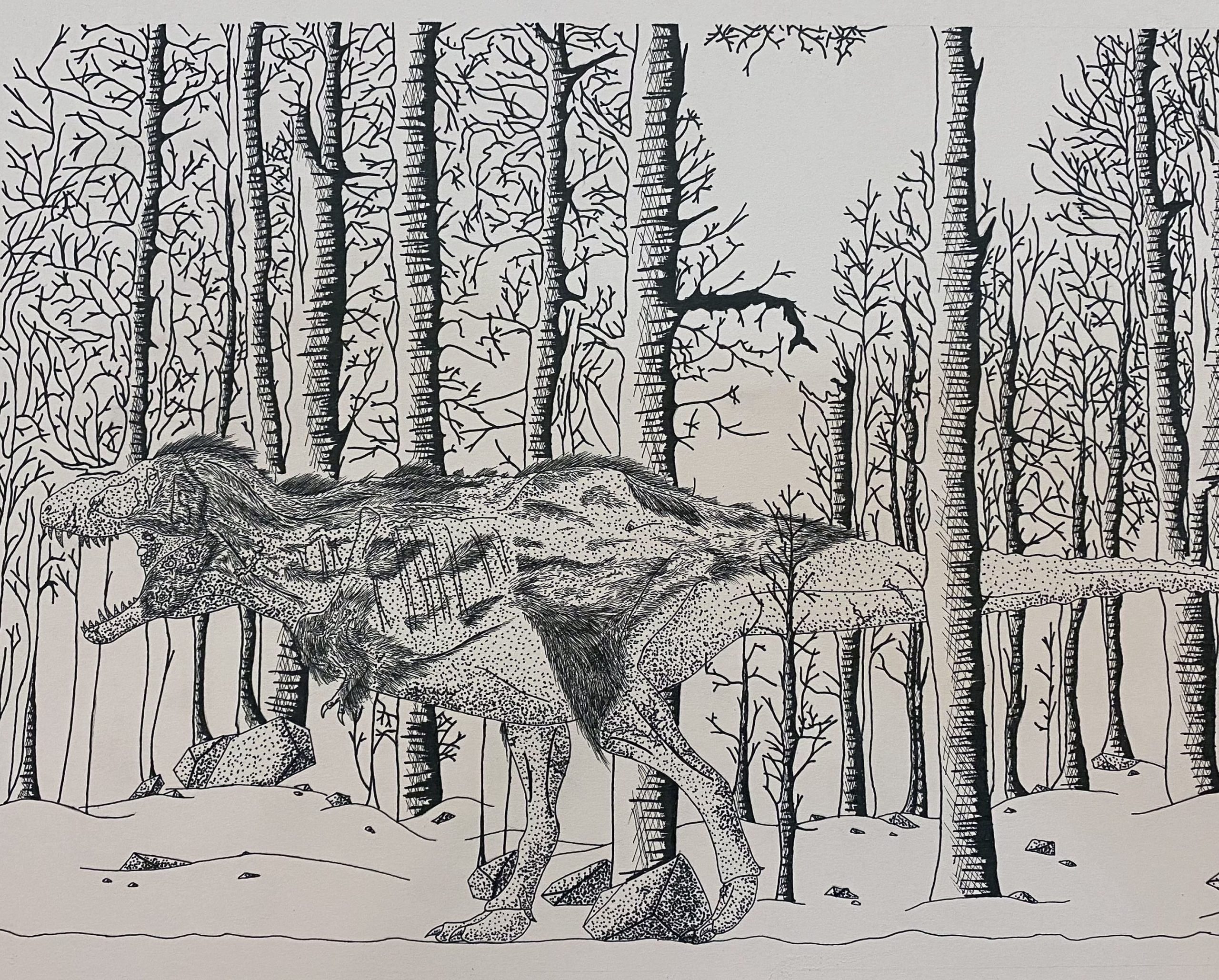Dominoes
Janet is standing under the tall street lamp, her face illuminated and shadows cast over the right side of her cheek. It is so early in the morning that not even the sun has woken up. She fumbles with the wrapper of her orange juice bottle and uses her front teeth to peel off the plastic covering. She is excited for the day. School is the only time Janet feels any bit of peace. She is putting the orange juice bottle to her lips when suddenly an arm reaches out and pushes the bottle above her head. With orange juice covering her face and dripping down her shirt, Janet shuts her eyes and cries out. Once she has cleaned the juice from her glasses, she sees her brother, Thomas, standing before her. He is two years older and wears a smug grin, eyes twinkling with mischief.
“Why would you do that?” Janet exclaims, face becoming red and tight, with either anger or embarrassment.
Thomas laughs and says, “You deserve it. You know to wait for me to walk to the bus stop in the mornings.”
When the bus arrives, Thomas shoves Janet to the ground, and races to climb onto the bus before her. Knees now scraped and callused, she gets up and starts to walk up the bus steps. When she sits down, covered in juice and blood and dirt, she hears Thomas and his friends snickering behind her.
When Janet arrives home from school, she completes her homework until her mother calls her to help set the table for dinner. She places the silverware neatly along the tablecloth and delicately sets her mother’s favorite candle in the center. This is Janet’s favorite part of the day. When she gets to help with the dinner process, she feels so helpful. She is worthy and needed at this time. She smiles quietly to herself when a spoon crashes into the wall, scraping her cheek along the way. Before she even has time to process what has happened, she hears Thomas’s cackle from behind her. When she turns around, he is sitting at the dinner table, smiling up at her.
“Mom, did you see that?” Janet bursts out.
Her mother, turns around opening a can of tomatoes, absently says, “What, hon?”
“He just threw that spoon at my head! It could have taken my eye out!”
Thomas rolls his eyes and sighs. “You’re such a liar, you know that? You’ll do anything to get me in trouble. It’s pathetic, Janet.”
“Mom, you didn’t see?” Janet knows her mother does not pay attention to them, but she is somehow hopeful, anyway.
Her mother finally turns around and says, “Don’t be so dramatic, hon. Boys will be boys. Now, get another spoon, will you?”
Janet feels her eyes begin to water and her cheeks start to burn. She opens her mouth and then immediately slams it closed. She doesn’t know why she feels disappointed. When has her mother ever believed her anyways? She begins to cry and moves her bifocals to wipe her eyes. She keeps her head down and silently moves across the kitchen, too embarrassed to continue setting the table.
“Oh God, now she’s crying. Jesus Christ. Do you always have to be such an attention whore?” Thomas says behind her, exasperated.
Janet knows that Thomas has never felt remorse. He has never felt sorry for her. Not when he has chased her home from school, shoved her against her locker, yelled in her face for accidentally running into him. He has never even validated that she has feelings at all. When she gets to her room, she closes the door quietly, not wanting to make more of a scene. She pulls open the top drawer of her dresser and takes out a box of her dominoes. She pulls them out and sets them on her bed and begins to play with no one in particular.
When Janet enters the seventh grade and Thomas enters his first year of high school, she begins to see less and less of her brother. He no longer takes the school bus; his older friends who are seniors drive him in their fast, loud cars. When their mother tells Thomas to make sure Janet gets to school safely, he jumps in his friend’s car and they race away, while showing her vulgar gestures with their hands. He is now rarely home and when he is, his friends are with him, and they are intoxicated. Instead of directly harming her as he usually does, he has begun to do so quietly. This was triggered by Janet’s frustration with her brother. After shattering a bone in her hand after Thomas had angrily slammed her door on her, she decides that she’s had enough and runs into their school counselor’s office hysterically sobbing. Snot and tears dripping down her face, she tells the counselor all about Thomas’s anger and erratic behavior until her crying takes over and she can no longer get a word out. This led to Thomas to be called into the office three times a week for mental health check-ups. Despite the fact that the school staff kept her name anonymous, Thomas had a gut feeling that she was the cause of these check-ups. Now, instead of public outbursts from Thomas, Janet’s life was full of whispered threats and drunken, quiet violence.
When she starts seventh grade, she determines to make this year different. Thomas was at a new school; he couldn’t hurt her here anymore. She took up extracurriculars. She became a member of the Environmental Club, even made her way up to vice president. She receives good grades and even has a group of friends. She spends weekends at friends’ houses and when she is home, her mother typically doesn’t notice her presence. Her teachers think she is charming, and she excels at algebra and chemistry. She displays a broad smile in the hallway, her teeth flashing and eyes crinkling. When she gets home from school everyday, she plays dominoes, now with a small grin.
She is walking down the hallway one day, making her way to the stairs, humming the tune of a catchy pop song that she heard on the bus, when a shadow looms over her. She stops in her tracks and looks up at the figure. Thomas gives a lopsided grin, his canine tooth stuck on his bottom lip. He’s probably still drunk from after school, she thinks. She tries to side-step him, but he moves faster to block her path. Despite her newfound confidence, she feels a twinge of fear and begins to shrink back. “How was school?” he sarcastically asks. She takes a step backwards. He follows. “Fine. It was fine.” He barks out a cruel laugh and shakes his head. Janet, feeling exasperated, takes a step toward the stairs. “Get away from me. I’m really not in the mood for this.” She makes it down the first step when she suddenly feels a sharp pain in the back of her arm. She whips around to find Thomas has his fingernails embedded in her flesh, pinching her until her skin is purple and bruising. “Don’t walk away from me,” he whispers harshly. “Did you hear me?”
“Yes!” Janet cries out. “Stop!”
He releases her arm, and she races down the stairs and out of the front door. When she takes a moment to look back, he is stumbling away to his room, chuckling to himself. She keeps running and begins to cry.
Adults don’t typically believe Janet. The school forces Thomas to march into the office three times a week, but that is the extent of their actions. On the bus at 6 A.M, Janet begins to wonder about her father, and whether he would believe her. Would he discipline Thomas or acknowledge his behavior? Perhaps if he was around, Thomas would not be like this at all, she thinks to herself. Her mother won’t even mention her father’s name. She only tells Janet that he does not care or worry about them. Janet doesn’t believe her and hates her mother for this. Deep down, she believes her father is a good man. She imagines herself as a child and him lifting her high up on his shoulders, so she can try to touch the clouds. She imagines him picking her up from school, helping her with her geometry homework, and laughing with her. She thinks that he had to leave because of her mother. When she imagines these false memories, she feels a deep longing, along with hatred for her mother that runs deep in her veins and pulses through her body. She shuts her eyes, as if this will block the thoughts of her father out completely. When her mind goes down this long road, she often thinks back on her childhood. It was not a completely morbid childhood, but it was not exceptional, either. She was a happy child, totally oblivious to the fact that she lacked a parent, an essential part of her being. She was quiet and calm and played with her dolls and read many books. Thomas was louder and more chaotic, but he didn’t seem to hate her as much back then. He did not take his anger out on her, but instead just broke objects and threw tantrums. Janet is brought back to a specific moment in her childhood, one that will forever be ingrained in the back of her mind. She was six, and she was sitting in the corner of her living room, on the floor behind the couch, reading a book. She remembers how cold and dusty the floor was, a side effect of her mother’s poor housekeeping skills. While reading, she idly swept her small fingers over the dust bunnies, watching them dance and twirl. She heard sneaky footsteps moving quickly to the kitchen, clearly wanting to be as swift and silent as possible. Curiously, Janet lifted her head above the couch and peered into the room. It was Thomas, looking as suspicious as ever, making his way to the counter, continuously peering over his shoulder. Janet kept watching and noticed an odd object in her brother’s hand. She observed him make his way to their fish, the only pet they were ever allowed to have. He twisted open the top of the container in his hand and sprinkled a sand-like grain into the bowl. Why is he so secretive about feeding the fish? Janet innocently pondered. He placed the container under the counter and sprinted off back to his room. Janet waited exactly 35 seconds to make sure he was truly gone and then made her own way to the fish bowl. Nothing seemed to be visibly wrong, so she slowly opened the cabinet to discover what he had been holding. She picked up the object and covered her mouth in terror. A dreadful knot formed in the bottom of her stomach, and she felt as if she had just been punched in her gut. With shaking hands, she lifted up the bottle to view its label. On the label was a silhouette of a rat being sliced through by a bold and threatening red “X.” She had cried for days after her fish died, her mother ignoring her accusations about Thomas. Janet shakes herself out of her flashback and continues to stare out the bus window at the sunrise.
Today is Wednesday, meaning it is time for Janet’s environmental activism club to meet at 5:00. It is a crisp day in the dead of January, so Janet has packed with her eleven packets of hot cocoa mix for her group members. Determined to restart her day, Janet attempts to focus on her anticipation for the meeting, rather than her harsh memories from her childhood. She sits down in first period, English literature, and opens her backpack. When she reaches her arm inside and pulls out a journal, she is surprised to see that this journal does not belong to her. It is a black, moleskin journal that is ripped and tattered from use. Its spine has been shattered and many pages ripped out. Unable to contain her curiosity, she peers inside the journal. She is immediately shocked to see the name that is written in such bold letters that the grey graphite from the pencil smears along the pages, leaving a foggy lead trail. Thomas Williams. She has the urge to slam the book shut or even hurl it across the room, but her interest takes over her fingers and before she even realizes it, she is opening to the next page. She doesn’t exactly know what she expected. His feelings and inner thoughts, poured onto the pages like a confession? Instead, she is staring at grotesque drawings of a mauled human body. She keeps flipping and the disturbing images continue, met by drawings of knives and swords and guns and axes. Did he mix up our backpacks? Was this meant for me? She doesn’t know if she is merely being sensitive, but this feels ominous, like a threat. When she begins to taste her breakfast on the tip of her tongue, she shuts her eyes and shoves the book at the bottom of the backpack. Her mind cannot seem to figure out what to tell her body to do, so she does nothing. Her teacher speaks and points, but she stares forwards at the light on top of the projector, unable to focus her vision.
When the clock extends its arm to greet the 3, Janet rises from her chair in chemistry class, and makes her way down the stairs, and out the school’s front doors. She walks with her head down, arms firmly hugging her chest. She knows she has her club meeting, but she cannot muster up the motivation to go. From the bus ride to school this morning, to the journal she found, she feels as though her brain is a puzzle, and its pieces have been swept off the table. A storm cloud seems to loom over her, causing her day to have a sinister mood. She passes her bus and continues treading along the sidewalk to her house, tears burning and threatening to pour out from her eyes.
Inside her room, her domino set greets her. A calm sense of peace washes over her as she plays alone, the sound of the Beatles playing on her phone faintly behind her. Playing dominoes with herself, she forgets about the cloud hanging over her and the troubles of her day. She forgets Thomas, her mother, her father, and her childhood fish. She smiles and makes her way to her bed. She lays down and picks up the book she is reading for English literature. She opens the page and reads about Victor Frankestein sewing his arm back together. She imagines sewing herself back together. All the parts of her missing being brought back to its whole, original state again. She is consumed by the pages of the book, when her phone starts to buzz and phone calls are rolling in. It’s Olivia. Probably upset with her for missing the meeting. She ignores the calls until her phone has not stopped ringing in three minutes straight. She reluctantly answers and before she can say hello, she hears Olivia, speaking in a harsh whisper.
“Where are you?” She whispers, clearly distressed.
“Um…I’m at home. What’s going on? Is something wrong?” Janet replies.
“We’re in the gym..We..We’re hiding. The whole school is on lockdown. I think someone might…” Olivia sniffles and cuts herself off. “I think someone might be in here.”
“What?” says Janet. “Someone like who?” Her memory brings her back to the journal. She remembers coming home from school, her uninterrupted walk upstairs. She realizes she has not seen her brother all day, actually. She looks down at her arm and stares at her scar, where her flesh was pinched and torn. She has a feeling in her gut and her heart drops. She releases the phone from her grasp and frantically sprints to Thomas’s room. Without any thought, she does something she has never done before. She rips open his bedroom door and is met with a vacant bed. Janet doesn’t know what pulls her legs forward. She does not know what divine force has told her intuition that she needs to go, but she bolts down the stairs, screaming her mother’s name. Her mom looks up, that absent look upon her face, and stares at her.
“Mom, get up! Mom, it’s Thomas, get up!”
Her mom blinks. “Hon, calm down,” she responds.
Janet begins to sob as she paces. “Please, mom, please believe me. Just this time, mom.” She begs.
She wonders what force led her mom to rise. What force moved her to grab her car keys and pull out of the driveway, down the road. During the drive, Janet stares out the window and back at her reflection. Fear has settled in her stomach and made a home for itself. Tears stream down her face and stain her red, blotched cheeks. Her mother calmly pulls the car into the school driveway, and they are greeted by chaos. Police and law enforcement are tearing down the school doors that have been bolted shut. Reporters speak to their cameras and morbidly curious spectators stop to listen.
“Lockdown…Intruder…,”
Other cars drive up, filled with horrified parents trying to get to their children. Janet recognizes Olivia’s mom racing out of her car and to a policeman, who attempts to calm her down. Janet tears open her car door and her mother follows. As she gets out of the car, she hears a sound that she will never get out of her memory, no matter how hard she tries. She hears the booming, violent sound of a gun being fired. Everyone in the crowd outside the school flinches and ducks; the air fills with gasps and shrieks. Soon after, the police make their way out of the school, dragging a human behind them. Janet lifts her hands to her mouth to stop a shout as she sees Thomas, face bloody and scratched, being dragged outside, with his hands behind his back. Her mother grasps her hand and squeezes, looking tired and devastated. Janet is too shocked to think twice about her mother’s sudden affection. Thomas, seeming to sense his family’s presence, lifts up his head and looks directly into Janet’s eyes and all the way into her soul. He gives a large, cruel grin, teeth stained with blood. As they drag him into the police car and slam the door behind him, the red and blue flashing lights illuminate Janet’s face, screaming at her. She cannot wipe the horror from her face as a single tear falls from her eye. She hears a sniffle and turns her head to the right. Her mother is silently crying and still holding her hand.
“I should have done something,” Her mother whispers, her voice weak and wavering. They watch the car race down the street, until the screaming lights can no longer be seen. They remain in the parking lot, gripping each other’s hands tightly.

